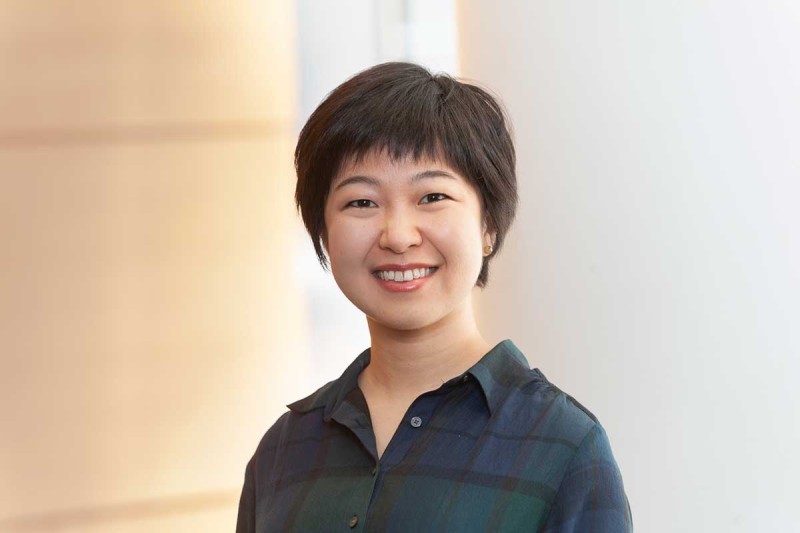
Siting Gan has the heart of a rebel. Although she focused on physics in high school in Beijing, China, where she grew up, and chose to major in physics in college, she knew that she “wanted to do research and discover things myself.” That determination to pursue her own questions led her to biology and, ultimately, to a unique situation at the Sloan Kettering Institute (SKI).
Since joining SKI three and a half years ago, Siting has been dividing her time equally between the Dana Pe’er Lab and the Joan Massagué Lab. She uses various approaches to study how primary cancers in the lung and breast spread to the brain and survive in the brain’s environment. The goal is to use both “wet” and “dry” research to better understand how tumor cells interact with brain cells to facilitate metastasis, in the hope of developing new therapeutic strategies to stop metastasis in its tracks.
What’s the difference between “wet” and “dry” research?
“There is a lot of back and forth between the two approaches but, in general, working with data and doing computer analysis is considered ‘dry,’ while doing bench work – working with reagents, cells, and mouse models, for instance – is considered ‘wet,’” Siting explains. “Sometimes, when there’s a lot of overlap, you could say your research is ‘damp’!”
Born for Science

Siting always enjoyed school, especially science, and had ample opportunity to pursue her interest.
“When I was growing up in China, students were encouraged to go into math and science,” she says. “We chose a concentration – either humanities or math/science – in high school. I chose the math/science program.”
While still in high school, students were required to select their college major — and Siting settled on physics. But in college at Peking University, she became interested in quantitative biology, which encompasses the use of mathematical, statistical, or computational techniques to study life and living organisms.
“I was fascinated by the questions that can be addressed with these approaches and very influenced by my mentors in college,” Siting says.
The more she learned, the more she wanted to do.
“I had a strong urge to get into experimental biology. I would do mathematical modeling and get predictions, but I always wondered, ‘How do I know if it’s true?’ It wasn’t satisfying enough for me if I couldn’t do experiments to test the predictions.”
After college, Siting was accepted into the systems biology program at Harvard University, where she completed her PhD.
“Everyone was very supportive,” she says about her years at Harvard. “Even though I had never held a pipette, I was accepted into the lab and encouraged to do my own experiments.”
The focus of her PhD was the circadian clock, which controls the 24-hour physiological and behavioral processes of many living organisms on earth. Siting studied how the clock in cyanobacteria, the simplest organism known to possess circadian rhythms, resets time in response to changes in the environment — the jet lag of cyanobacteria.
After her graduate training in both “wet” and “dry” approaches, Siting wanted to pursue something more complex.
“I knew I wanted to do cancer research and also felt that I needed more training in big data. Dana is an expert in this field, so I approached her about working in her lab,” she says. “When I told her that I also wanted to do experimental work, she discussed a collaboration with Joan’s lab.” Soon, Siting was experiencing the best of both worlds.
The Pursuit of What Is “Interesting and Important”
Siting loves the opportunity she has at SKI to follow a question that is both interesting to her and important to people with cancer.
“I got into brain metastasis because the interplay between metastatic cancer cells and the microenvironment of the brain is interesting from a biological point of view, but also because it’s so important clinically,” she says.
Siting feels the sense of urgency that comes with something as important as cancer research — and she experiences occasional disappointments in the lab as every scientist does. But it doesn’t distract her.
“In my personal experience, I find that what we call a ‘failure’ is often an opportunity,” she says. “I may get to understand something technical that I could improve next time. Or maybe my hypothesis was wrong, and this allows me to think through everything differently.”
She admits to becoming easily obsessed by her work. “It’s hard for me to do anything else when I’m tackling a new question,” she says. “I troubleshoot, talk to people, review my data — trying to let go is more stressful than staying focused.”
When she does manage to “let go,” she enjoys the “breadth of science” available at MSK and takes full advantage of the many opportunities to attend talks and get help and ideas from others.
She also manages to find time outside of the lab for art. As a child, she learned traditional Chinese painting and calligraphy and is thrilled by all the museums that New York City offers. Siting also takes ballet classes with a friend from Dr. Massagué’s lab, renewing an interest in dance that she discovered in graduate school in Cambridge.
Life in the lab, and life in New York, is good, filled with new things to try and pursue, and Siting remains grateful.
“Being able to come to MSK for research was always a dream,” she says.